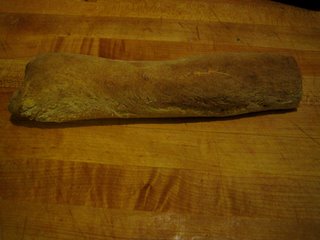Can this be Pappalardo's?

This may look like a loaf of bread to you, but it's a lot more than that.
In their Lasagna Days, when The Great Plotnik first arrived in The Big Shmapple, he and Ducknik discovered an old-world bakery on Mulberry Street. It was named Papallardo. It was still being run by ancient, white-haired Mr. and Mrs. Papallardo, he short and she shorter, using the brick ovens that they had brought over from Bari, Italy, brick by brick. There was a glass case in the front of the shop, into which Mr. Pappalardo poured long, thick loaves from short, flat wooden peels. The breads piled in on top of each other, and when a customer walked through the front door, jingling the little ice cream bell over the archway, Mrs. Pappalardo walked forward, wiping flour from her hands onto her apron, smiled, reached into the case to pull out several loaves, then wrapped each hot, sweet-smelling beauty in white paper, took a few coins for each one and waited for the door to jingle again, as the happy customer walked out into the narrow street, before she returned to the back of the shop to help her husband.
Their bakery supplied bread for the famous Luna Restaurant next door -- in fact there was a private door in the back that connected the restaurant to the bakery.
In a neighborhood of Italian bakeries, in a city of Italians who took glorious pride in their baking, in a region of the country where bread and pizza dough were the true measure of a man's wealth, there was no bread as perfect as Pappalardo's Italian Bread. None.
One day, to stop Plotnik from his continuous whining about it, Mr. Pappalardo told Plotnik his two secrets were using graham flour in the dough, and the particular heat he got from his brick ovens. But there were other secrets too, and apparently Mr. Pappalardo never told anybody what they were, because when Mrs. Pappalardo died, and Mr. Pappalardo closed the bakery, that bread was gone forever.
Now, the bread you got at Luna's with your plate-a linguini, half-a shrimp, half-a clams, became ordinary. Plotnik and Ducknik never again tasted that extraordinarily chewy, dense but moist, flavorful bread from the heavens. After moving West, they forgot all about it.
Until last night. Living in Saint Plotniko, P and D have said many times, to anyone who would listen, that Acme and Semifreddi and Metropolis and a handful of other, small, artisan bakeries in Saint Plotniko, Smokeland and Berserkley turn out the finest loaves in America. So, last night, when this very loaf you're looking at was brought to their table at Lupa Restaurant in Noe Valley, OK, not THIS loaf, but its two late brothers, both of whom were consumed like wolves by P and D, it should have been a surprise that at the very same moment Plotnik looked at Ducknik and Ducknik looked at Plotnik and said: "Pappalardo's? Can this possibly be?"
But it was no surprise. That amazing bread had imprinted itself in both their brains, so strongly that 35 years later and one taste was all it took to bring it back.
After dinner, the waiter took pity upon the Plotniks and brought another loaf to the table for them to take home.
Memory is not what it once was. Plotnik can't remember where he puts his keys and Ducknik always claims she tells Plotnik things that she hasn't. But Plottie never forgets a bite of anything he has eaten. This bread at Lupa's, made in the back of the restaurant, comes as close to the sainted memory of Mr. and Mrs. Pappalardo than any bread either Plotnik or Ducknik have eaten in the 35 years since Pappalardo's little ice cream bell stopped jingling.


1 Comments:
but really... did plotnik ever know where he'd put his keys?
plotnik and ducknik better start fasting now so that they can eat their way through the big shnapple very soon.
bzwz
Post a Comment
<< Home